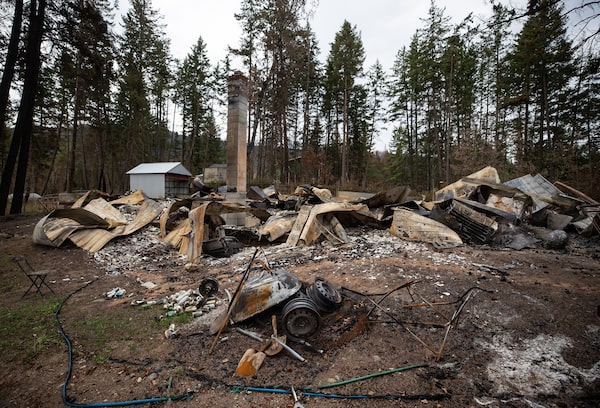A motorist drives on a service road along the closed Trans-Canada Highway as floodwaters fill the ditches beside the highway and farmland in Abbotsford, B.C., on Dec. 1.DARRYL DYCK/The Canadian Press
Kevin Barlow is the B.C. executive director for the Canadian Parks and Wilderness Society and a member of the Mi’kmaw nation.
I used to hear a prophecy from the elders when I was a child, growing up in New Brunswick as a member of the Mi’kmaw nation. I find myself thinking about it now as I put up my umbrella once again, against British Columbia’s atmospheric rivers and torrential rains.
The prophecy, from the Hopi people, states we would enter a period of great chaos, believed to start around the year 2030. It predicts tsunamis, major earthquakes and parts of North America under water, or as a series of lakes and islands. The situation could only be stopped by people working together – people they called the “warriors of the rainbow.” I believe we are seeing the beginnings of this prophecy now.
That’s why I was glad to hear last week’s federal Throne Speech drawing the clear connection between climate change and biodiversity loss, and affirming that loss contributes to the impact of climate change. This is a vicious cycle that we need to stop.
B.C. braces for third ‘atmospheric river’ after recent floods
John Horgan leads a province under siege while dealing with his own personal crisis
It’s not a moment too soon. I’ve lived in B.C. for a decade now and never imagined I’d see climate change take hold here so quickly. But there it was – the summer heat dome, which saw billions of shellfish cooked alive on the shores, and more than 800,000 hectares of forests destroyed in one of the worst fire seasons on record.
And now, the flooding: Displaced rivers and lakes are returning to their natural locations, and water is everywhere, making its own path. Mother Earth is demanding we pay attention. These are the disasters that the elders have warned us about.
We need B.C.’s government to follow the federal lead and commit to protecting more nature in the province before the damage becomes too great to repair.
There are some initiatives already in place. Last February, our federal and provincial governments committed to developing a Nature Agreement, which will bilaterally unite them in conserving more of B.C.’s biodiversity and protecting species at risk, such as the spotted owl. In August, the federal government promised another $796-million for nature conservation, and $340-million for Indigenous-led conservation.
This is a step in the right direction, but it’s not enough. B.C. needs to use that money wisely, and apply it to concrete targets. The federal government has promised to protect 30 per cent of Canada’s lands and waters by 2030, but it’s clear that climate change is moving faster than we are.

A chimney is all that remains standing at a home that was destroyed by the White Rock Lake wildfire in Monte Lake, B.C., in August.DARRYL DYCK/The Canadian Press
At this point, we need B.C. to set an interim goal of protecting 25 per cent of the province by 2025, to help safeguard these ecosystems and make them more resilient to a warming world.
Indigenous-led projects such as Dene Kʼéh Kusān would put B.C. on the way to meeting these targets. The Kaska Dena communities plan to protect an area in northeastern B.C. that’s larger than Vancouver Island. There are no clear-cuts, no mines and no settlements. There’s not even a road in this four million hectares of new protected land, abundant with wildlife such as caribou, moose and mountain goats.
It is not too late to make changes. Setting aside more natural habitat and ensuring that species at risk are not lost forever requires action at all levels. As individual citizens, elected officials, businesses and communities, together we must do more. I hope to see that commitment highlighted in B.C.’s Throne Speech next spring.
Weaving together Indigenous and Western knowledge can create the optimal responses we need to slow and reverse the loss of biodiversity. Remember that Indigenous people practised a sustainable way of life that let them survive for millennia.
We have the capacity to bridge whatever social divides we have for the sake of those generations coming after us. We can work together on this important call to action. Together, we can be the Warriors of the Rainbow that the Hopi prophecy spoke of, who can heal Mother Earth and make it green again.
Officials provide an update on the flooding response in B.C. as the province braces itself for more storms, which are expected to sweep over areas of the province already struggling to recover last week’s floods.
The Canadian Press
Keep your Opinions sharp and informed. Get the Opinion newsletter. Sign up today.